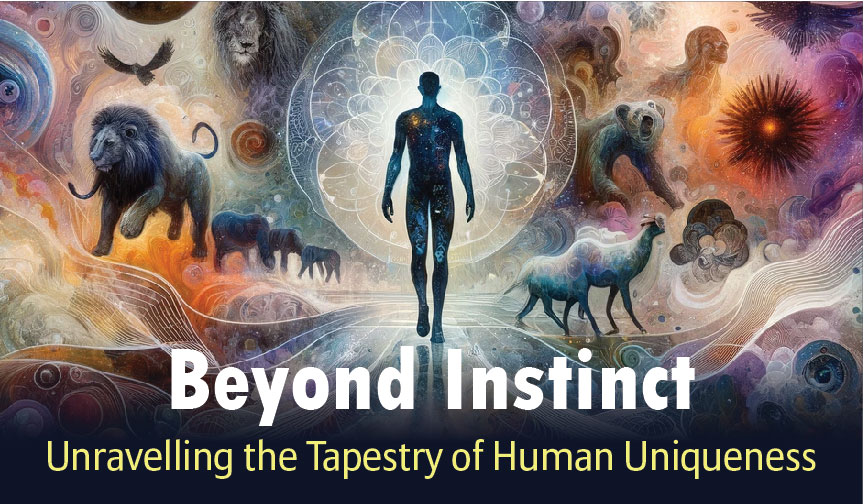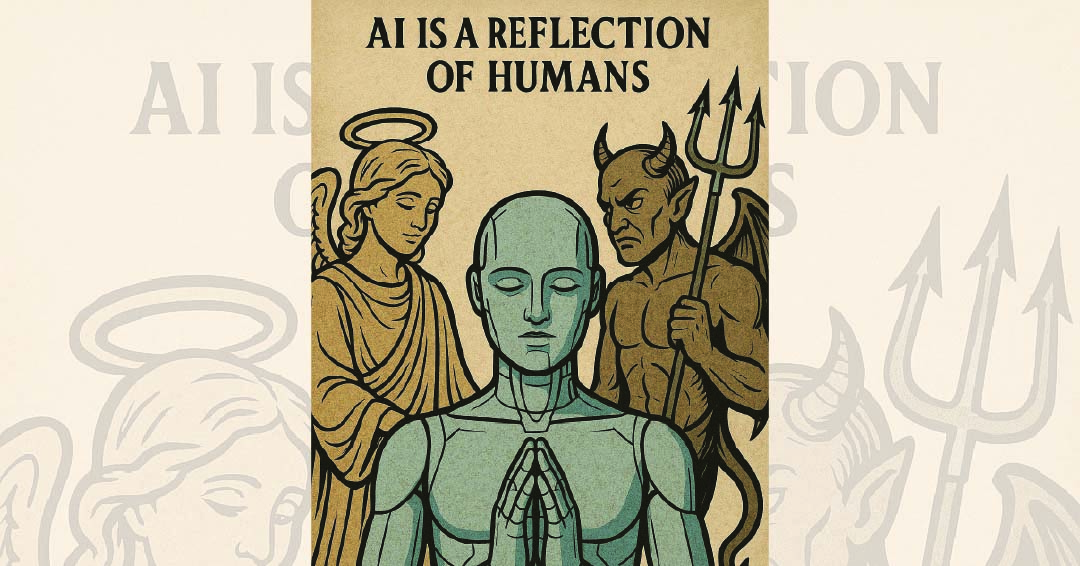Beyond Instinct: Unravelling the Tapestry of Human Uniqueness

Recently, I was having an interesting discussion with a colleague of mine, during this conversation, my colleague said that he recently saw a couple of human beings fighting like animals. This line, stuck with me, and I started deliberating ‘What is the difference between animals and human beings?’ If you start drawing similarities, you will realize we are the same in terms of biological needs or processes, like us, animals are also born, then they grow up, become independent, maybe hunt, eat, procreate, fall ill, and die. Both humans and animals emerge from the same primordial soup, shaped by the forces of evolution over millions of years. We share a biological kinship, rooted in the same genetic code that dictates our physical form and functions. This deep interconnectedness binds all life on Earth. So, what makes us different from animals? It's a question that has intrigued philosophers, scientists, economists, and many a curious mind for centuries.
As I delved into this topic, I realized, humans possess a level of consciousness that sets them apart from animals. While animals exhibit various degrees of awareness and cognitive abilities, human consciousness is characterized by a higher level of self-awareness, introspection, and control of emotions. Our capacity for abstract thought, complex language, and self-awareness imbue us with a unique cognitive landscape. It is through these faculties that we navigate the world, crafting narratives, shaping cultures, and pondering the mysteries of existence. While animals also experience a wide range of emotions and have their own ways of expressing them, certain aspects of human experience seem to set us apart. One such aspect is laughter. I've never seen any animal laugh in the way humans do. It's a peculiar thing when you stop to consider it. Laughter is not merely a reflex or a response to stimuli; it's a complex social phenomenon that reflects our thoughts, feelings, and perceptions of the world around us. Human beings laugh at times at the irony of life, on something disturbing or sad, in such situations, people laugh at the situation rather than the outcome. Think about it - when was the last time you saw a dog chuckle at a joke or a cat giggle at a playful gesture? It's unlikely that you have, because laughter, as we understand it, appears to be uniquely human. Sure, animals exhibit behaviors that might resemble laughter, like panting or vocalizations during play, but these expressions lack the depth and complexity of human laughter. This chain of thought led me to consider one more aspect of human emotion, our ability to control or regulate our emotions. Unlike animals, whose emotions are largely driven by instincts or environmental factors, humans can regulate their emotions and consciously decide how they want to feel. With practice, we can choose to cultivate joy, gratitude, and optimism, even in the face of adversity. This ability to shape our emotional landscape is a powerful testament to the depth of the human experience.
But what accounts for these differences between humans and animals? Some might argue that it's our superior intellect or advanced cognitive abilities that set us apart. The proportion of human body weight allocated to the brain relative to other animals correlates with our heightened cognitive capacities. This higher brain-to-body weight ratio reflects the evolutionary emphasis on complex cognitive functions in humans, enabling advanced abilities. While it's true that humans possess a higher degree of cognitive complexity compared to other species, I believe there's something more profound at play. It's our capacity for self-awareness and introspection that truly distinguishes us. This ability allows us to understand our motivations, desires, and beliefs, leading to a deeper understanding of ourselves and the world around us. Through introspection, humans can contemplate abstract concepts, make moral judgments, and envision alternative futures, shaping our behavior and interactions in unique ways that transcend mere instinctual responses seen in animals. Similarly, our capacity to choose our mood speaks to our ability to reflect on our emotions, understand their underlying causes, and make conscious decisions about how we want to respond. This is precisely why, we must constantly undertake introspection else we risk succumbing to instinctual responses, living in a state of reactive rather than proactive existence. Through self-awareness, we gain insight into our values, motivations, and behaviors, allowing us to make informed decisions and pursue meaningful goals. This enables us to learn from past experiences, cultivate empathy, and develop resilience in the face of challenges. By engaging in these practices, we transcend mere existence, unlocking the full potential of our humanity and contributing positively to our personal growth and the world around us. Striving for a higher purpose sets humans apart, imbuing our lives with meaning and direction. While animals may live primarily to fulfill basic survival needs, humans aspire to something greater – whether it's pursuing knowledge, creating art, fostering relationships, or contributing to the well-being of society. This pursuit of a higher purpose gives our lives depth and significance, driving us to transcend our immediate circumstances and strive for personal and collective growth. It fuels our aspirations, fosters resilience in the face of adversity, and inspires acts of compassion and altruism that enrich both our lives and the world we inhabit. Human beings have evolved; we also started as simple animals, which then evolved into hunter-gatherers, followed by the emergence of small groups or tribes, which eventually led to the development of more prominent societies, cities, and countries. On the other hand, animals exist in packs or heard, but they do not collaborate in an organized fashion to bring something meaningful. True, we see some symbiotic relationships in the animal kingdom, but these relationships evolve only to a certain extent. I recall visiting a wildlife sanctuary some time ago, where I saw a monkey sitting on the tree top and a deer near the trunk. The monkey was shaking a few branches, which caused some fruits to fall, which the deer ate. The monkey could also be an early warning sign for the deer if a lion is nearby. In exchange, the deer too use their sharp senses to warn monkeys of predators. However, these are limited examples, mostly done for survival while humans undertake such collaboration to thrive and attain interpersonal growth.
In essence, what sets humans apart from animals is not just our cognitive prowess or physical capabilities but our capacity for emotional depth and self-awareness. Our ability to forge meaningful relationships, and work closely with each other for the betterment of all, makes us different. We are beings capable of experiencing a rich tapestry of emotions, from joy and love to sadness and despair. So, the next time you find yourself laughing uncontrollably or consciously choosing to see the bright side of life, take a moment to appreciate the depth of your humanity. For in those moments, you are not just an animal reacting to the world around you; you are a conscious, self-aware being capable of shaping your destiny. And that, my friends, is what truly sets us apart!
About the author

Tapan Singhel is the MD & CEO of Bajaj Allianz General Insurance Company Limited. This blog has been initiated by him so that he can directly interact with all the valuable customers and employees of this company.
 Service Chat:
Service Chat: 



Leave a Reply